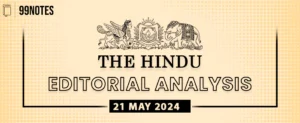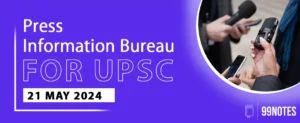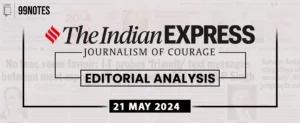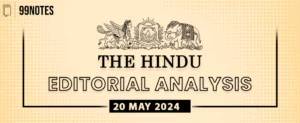Topic: GS2 – Governance – Government policies – Interventions for development in various sectors This topic is relevant for both Prelims and Mains in the context of understanding the challenges and evolution of electoral processes in India. |
| Context: |
|
Evolution of the Model Code of Conduct:
- The article transitions to a historical overview of the MCC’s development, tracing its origins from a rudimentary set of guidelines in 1960 to its refinement and expansion over subsequent decades.
- It emphasizes the MCC’s role in setting behavioral standards for political parties, candidates, and electoral authorities to uphold the integrity of the democratic process.
Challenges to the MCC’s Efficacy:
- However, despite its evolution, the MCC faces formidable challenges in contemporary politics.
- Violations are widespread, with political leaders resorting to prestige, firepower, and demagoguery to circumvent its provisions.
- The article underscores the diminishing effectiveness of the MCC in curbing malpractices, particularly in the face of evolving technologies and changing political dynamics.
Call for Reform:
- Recognizing the shortcomings of the current framework, the article advocates for a remodeling of the MCC to address its deficiencies.
- It proposes imposing more stringent and transparent penalties for violations, particularly targeting egregious offenses such as hate speech and inducement of voters.
- The article underscores the need for a fair and predictable enforcement mechanism to restore decorum and discipline in public discourse.
Enhanced Enforcement and Accountability Measures:
- To bolster the MCC’s enforcement, the article suggests streamlining procedures for handling violations and ensuring swift punitive action within a specified timeframe.
- It calls for greater transparency through public disclosure of reported violations and their resolutions.
- Additionally, it recommends integrating legal enforcement mechanisms to complement the EC’s actions, thereby holding violators accountable under existing laws.
Emphasis on Leadership Integrity:
- Ultimately, the article contends that while regulatory frameworks like the MCC are essential, true accountability lies in the character and conduct of political leaders.
- It underscores the importance of ethical leadership in fostering public trust and confidence in the electoral process, transcending the limitations of regulatory codes.
Conclusion:
- The article highlights the necessity for reforming the Model Code of Conduct (MCC) to address the shortcomings in its enforcement and to restore integrity to the electoral process.
- It emphasizes the need for more stringent penalties for violations, streamlined procedures, and greater transparency.
- Ultimately, the focus is on fostering ethical leadership and public trust in electoral governance.
| About MCC |
What is MCC ?:
|
| PYQ: Discuss the role of the Election Commission of India in the light of the evolution of the Model Code of Conduct. (UPSC CSE (M) GS-2 2022) |
| Practice Question: How has the evolution and contemporary challenges of the Model Code of Conduct (MCC) in India’s electoral process highlighted the necessity for reform, and what measures are proposed to enhance its effectiveness and integrity? (250 words/15 m) |











